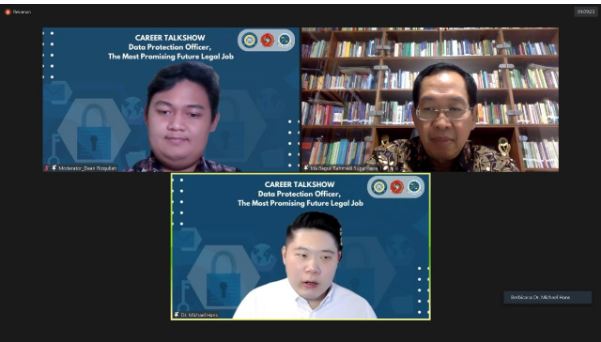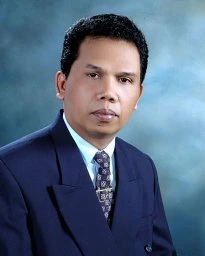Law Number 27 of 2022 Concerning Personal Data Protection was promulgated on October 17, 2022. The provisions regulate the rights of personal data subjects and the obligations of controllers and processors of personal data. One of the obligations contained in Article 53 of the PDP Law is to appoint officials or officers who carry out the Personal Data Protection function (or Data Protection Officer), as long as they fulfill one of several conditions. The PDP Law, in its explanation, provides an understanding of Data Protection Officers as officials or officers responsible for ensuring compliance with the principles of Personal Data Protection and mitigating the risk of violating Personal Data Protection. One of the requirements to become a Data Protection Officer is understanding personal data protection law so that it can become a new profession for law graduates. This later became the background for holding a Career Talkshow by Business Law Studies, Faculty of Law, Airlangga University, with the theme “Data Protection Officer, The Most Promising Future Legal Job”.
The activity which was held on Saturday, 12 November 2022 presented two speakers, namely Prof. Dr. Ida Bagus Rahmadi Supancana, S.H., M.H. as Co Founder of the Indonesian Data Privacy Professional Association (APPDI) & Professor of Law at Atma Jaya Catholic University and Dr. Michael Hans, S.H., S.E., M.Kn., LL.M., CLA, CCD as Certified Data Protection Officer & Advocate at MHANSLaw. This activity was also considered unique because it was delivered in a talk show format, allowing participants to ask questions freely according to directions from the moderator. The knowledge shared by the two speakers also adjusted their respective portions according to their professional backgrounds as academics or practitioners.
Through this opportunity, Prof. Dr. Ida Bagus Rahmadi Supancana, S.H., M.H. as an academic explained that the Data Protection Officer profession is a promising legal profession as a result of technological developments in a global context in various organizations, both public and private, with promising income. Every human activity will require personal data processing because it involves information privacy as part of fundamental rights. The duties of a Data Protection Officer are to ensure the rights of data subjects are protected and ensure controllers and processors comply with their obligations. In fact, before the passage of the PDP Law, the Indonesian Data Privacy Professional Association (APPDI) had started holding certification up to the 9th batch, with 40% of the participants coming from legal circles. Quoting from the Ministry of Communication and Informatics publication regarding the Grand Design of the Data Protection Officer Ecosystem, Indonesia needs at least 155,000 Data Protection Officers in the future. However, the reality is that the number of Data Protection Officers in Indonesia is currently around five hundred people, which means that it still needs to be closer to the required number.
Furthermore, Dr. As a practitioner, Michael Hans, S.H., S.E., M.Kn., LL.M., CLA, CCD explained that working as a Data Protection Officer can be either in-house or as-a-service like today’s advocates. Although promising, working as a Data Protection Officer still has its challenges in Indonesia. This is because the understanding of the public and the parties regulated in the PDP Law, both the public and private sectors, still needs to be improved in the importance of protecting personal data. As an illustration, he explained that the Bjorka case that had occurred in Indonesia alone had yet to be able to create awareness of the importance of protecting data. According to him, all forms of activity, both digital and conventional, always have a relationship with personal data that must be protected. As for becoming a Data Protection Officer, at least three things are needed:
- You have to be intimate with having an interest in law and technology because the work of a Data Protection Officer will often intersect with technology, although only sometimes.
- The importance of formal and informal education, such as through seminars or attending certification.
- Understand that the actual profession of Data Protection Officer in Indonesia still needs legal legitimacy because they have to wait for implementation regulations from the PDP Law, so it is felt necessary to prepare other professions, such as advocates.








